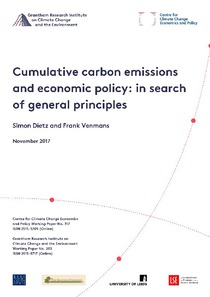Cumulative carbon emissions and economic policy: in search of general principles
"We exploit recent advances in climate science to derive a surprisingly simple model of efficient climate policy. The model yields closed-form solutions for optimal peak warming, optimal emissions along the transition to peak warming and optimal carbon prices, with and without a temperature con...
| Main Authors: | , , , |
|---|---|
| Institution: | ETUI-European Trade Union Institute |
| Format: | TEXT |
| Language: | English |
| Published: |
London
2017
LSE |
| Subjects: | |
| Online Access: | https://www.labourline.org/KENTIKA-19394868124911120409-Cumulative-carbon-emissions-an.htm |
| _version_ | 1771659896040718336 |
|---|---|
| author | The Centre for Climate Change Economics and Policy Grantham Research Institute on Climate Change and the Environment Dietz, Simon Venmans, Frank |
| author_facet | The Centre for Climate Change Economics and Policy Grantham Research Institute on Climate Change and the Environment Dietz, Simon Venmans, Frank |
| collection | Library items |
| description | "We exploit recent advances in climate science to derive a surprisingly simple model of efficient climate policy. The model yields closed-form solutions for optimal peak warming, optimal emissions along the transition to peak warming and optimal carbon prices, with and without a temperature constraint that is consistent with the UN Paris Agreement. We draw five conclusions. First, optimal peak warming has an elasticity of one or more with respect to several parameters that are highly uncertain. This implies optimal peak warming is itself highly uncertain. Second, even if optimal peak warming is high, optimal transient warming over the coming centuries is not. The transition is slow, because of the stock-flow nature of CO2-induced warming. Third, the optimal carbon price grows faster than output this century and the possibly unexpected reason for this is the saturation of carbon sinks, a well-known physical property of the climate system hitherto absent from economic models. Fourth, the optimal carbon price under a binding temperature constraint comprises the social cost of carbon, plus a Hotelling premium. If we take account of damages, then we should abate emissions more quickly than if we simply meet the temperature constraint at the lowest abatement cost. Fifth, when the objective is to minimise abatement costs alone, the optimal carbon price follows the simple Hotelling rule, not various kinds of augmented Hotelling rule, as in previous work. Again this comes from taking into account the effects of saturating carbon sinks, as well as not over-estimating thermal inertia in the climate system." |
| format | TEXT |
| id | 19394868124911120409_7d0b496776044c728811e326f9a9960d |
| institution | ETUI-European Trade Union Institute |
| is_hierarchy_id | 19394868124911120409_7d0b496776044c728811e326f9a9960d |
| is_hierarchy_title | Cumulative carbon emissions and economic policy: in search of general principles |
| language | English |
| physical | 48 p. Digital |
| publishDate | 2017 |
| publisher | London LSE |
| spellingShingle | The Centre for Climate Change Economics and Policy Grantham Research Institute on Climate Change and the Environment Dietz, Simon Venmans, Frank climate change environmental policy gas emission economic policy Cumulative carbon emissions and economic policy: in search of general principles |
| thumbnail | https://www.labourline.org/Image_prev.jpg?Archive=120775794895 |
| title | Cumulative carbon emissions and economic policy: in search of general principles |
| topic | climate change environmental policy gas emission economic policy |
| url | https://www.labourline.org/KENTIKA-19394868124911120409-Cumulative-carbon-emissions-an.htm |

